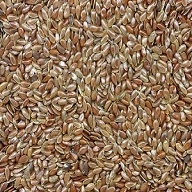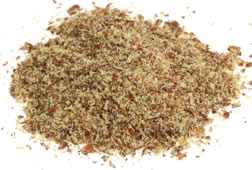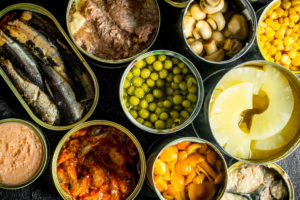What are the Health Benefits of Flaxseed?
 Why flax? Flax is a powerhouse of disease-fighting compounds that researchers have found to prevent heart disease, protect against inflammatory disorders and certain cancers, and lower your cholesterol.
Why flax? Flax is a powerhouse of disease-fighting compounds that researchers have found to prevent heart disease, protect against inflammatory disorders and certain cancers, and lower your cholesterol.
Research shows that alpha-linolenic acid (ALA), the omega-3 in flax, can help to prevent heart disease and inflammatory disorders. When consumed, ALA in flax allows nutrients to enter the body’s cells and aid in the removal of toxins which makes this fatty acid “essential to life.” But the body can’t produce ALA on its own, and it must be obtained from sources like flax.
Flax’s high content of lignans may help prevent certain cancers and its high fiber content can reduce blood cholesterol and the risk of type-2 diabetes. Flax is the best plant source of lignans which are natural antioxidants that may reduce the activity of cell-damaging free radicals, slow the aging process, and increase overall wellness. These tiny seeds provide up to 700 times more lignans than legumes or  whole grains. Also, flax is an excellent source of both soluble and insoluble fiber, which ease the effects of type-2 diabetes as well as promote heart, colon, and digestive health.
whole grains. Also, flax is an excellent source of both soluble and insoluble fiber, which ease the effects of type-2 diabetes as well as promote heart, colon, and digestive health.
An easy addition to a healthy diet Flax is an ideal ingredient added to many products on today’s grocery shelves such as breads, energy bars, cookies, crackers, and pastas. Whether it’s whole seed or milled, adding flax’s mild, nutty flavor to favorite foods makes every dish a nutritious treat.
Research
As the threat of heart disease, cancer, and diabetes continues to grow, we seek information about how to cure or prevent these diseases. In the following research, discover how this incredible seed could benefit the lives of you, your friends, and family.
- Omega-3 Fats in Flax and Fish
- Omega-3 Fats for Infants
- Flax and the Low-Carbohydrate Diet
- Flax Favorably Affects the Immune System
- Flax Favorably Affects Risk Factors that Contribute to Heart Attacks and Stroke
- Flax Reduces Inflammation Leading to Atherosclerosis
- Omega-3 Fats May Protect Against Arrhythmia
Flax is a healthy little seed that can easily be incorporated into your busy lives. One to two tablespoons (16g) daily can be added to diets in a variety of ways. Keep reading for some helpful hints to get your daily dose.
Replace fat: Keep good fats in your recipes by substituting 3 Tbsp. of ground flaxseed for 1 Tbsp. of margarine, butter, or cooking oil.
Keep it handy: In your refrigerator, keep a handy stash of ground flax accessible in an opaque, airtight container for up to 45 days. Whole flaxseeds can be stored for up to a year! Just use a coffee or spice grinder when you need it in its milled form, which is when it offers its biggest health boost.
Simple on cereal: Sprinkle 1 to 2 Tbsp. of milled or whole flaxseed onto your morning cereal or over salads for a nutty taste.
Dress-up: Shake or stir your daily dose of flax into your salad dressing.
Shake things up: Mix milled flax into yogurt or smoothie shakes for an extra
energy boost.
Top that: Top your fruit and cottage cheese with flax for a crunchy flax punch.
A final touch: Stir it into thicker soups such as lentil or bean varieties or into pasta sauces just before serving.
 In the mix: You can always mix whole or milled seeds into your favorite bread dough. Also think about mixing it into burgers, meatloaf, and fish or vegetable patties as a tasty change.
In the mix: You can always mix whole or milled seeds into your favorite bread dough. Also think about mixing it into burgers, meatloaf, and fish or vegetable patties as a tasty change.
Flaximum benefits: Add whole flaxseeds to cookie dough and muffin mix or sprinkle some on your favorite bread for artisan appeal.
Getting started: When using ground flax, because of its high fiber content, add it slowly starting with about a tablespoon a day and work up to two or more per day.
Flax and Your Health
Q: What are the health benefits of flax?
A: Flax contains several disease-fighting compounds, primarily the omega-3 fatty acid, alpha-linolenic acid (ALA), fiber, and lignans. Flaxseed is one of the richest sources of ALA, a polyunsaturated fat that offers unique heart health benefits. Flax is an excellent source of both soluble and insoluble fiber, providing three grams of fiber per tablespoon. Flax also is packed full of lignans, natural cancer-preventative phytonutrients. Flax also is full of vital vitamins and minerals such as folate, vitamin E, vitamin B-6, copper, zinc, magnesium, and (dry ounce for ounce) more potassium than seven bananas. Flax has been shown to help prevent heart disease and lower its risk factors, reduce symptoms of inflammatory disorders, protect against cancer, reduce cholesterol, and even ease the effects of Type 2 diabetes. Learn more about the health benefits of flax and make it an important part of your daily diet.
Q. What is so beneficial about omega-3 fatty acids?
A. The majority of U.S. diets no longer contain the amount of omega-3 fatty acids needed for overall health and wellness. Omega-3 fatty acids correct imbalances in modern diets that lead to health problems. Today, Americans are consuming more than 10 times as many omega-6 fatty acids (another essential fatty acid family which is required by the body in moderate, not excessive, amounts) as they are omega-3 fatty acids thanks to the increase of fatty, highly processed foods in today’s diet. Eating less omega-6 and more omega-3 fats from foods like ALA-rich flax can help lower the risk of chronic diseases like heart disease, stroke, and cancer, as well as lower LDL or “bad” cholesterol. In fact, large scale studies confirm that plant-derived omega-3’s offer unique heart-healthy benefits and may be even more effective than fatty fish and fish oils in lowering the risk of some coronary diseases. Recently, scientists have discovered that flax may play an important anti-inflammatory role in reducing immune system diseases. Flax ALA has been shown to lower blood levels of a compound called C-reactive protein or CRP. Reducing this inflammatory compound appears to be as important as lowering LDL cholesterol in preventing heart attacks and strokes.
Q. What are lignans?
A. Lignans are natural antioxidants that reduce the activity of cell-damaging free radicals, slow the aging process, and increase overall wellness. Flax contains up to 800 times more lignans than other plant sources, such as whole grains and legumes. Besides acting as antioxidants, lignans are phytoestrogrens — active substances derived from plants that mimic the action of estrogen hormones in the body. Research continues to show their potential for treating menopausal symptoms without traditional drugs and reducing the risk of hormone-sensitive cancers of the breast, prostrate, and endometrium. Lignans are especially important for women as studies have shown them to decrease the risk of breast cancer, as well as minimize cancer symptoms and reduce the spread and growth of breast cancer after diagnosis. Lignans also possess powerful antioxidant and anti-inflammatory properties associated with a lower risk of artery-clogging plaques and diabetes. Lignans have also been found effective in lowering the risk of type 1 and 2 diabetes.
Q. What’s the difference between omega-3 fatty acids from flax and those found in fish oil?
A. Flax is very high in the omega-3 fat ALA (alpha-linolenic acid). This is the “essential” omega-3 fat because our bodies need it to be healthy. However, because our bodies don’t produce it, we must consume it from other sources, like flax. Other omega-3 fats, EPA (eicosapentaenoic acid) and DHA (docosahexaenoic acid), found in fatty fish, are vital for health, but not “essential,” because our bodies can make them from ALA. All of these omega-3 fatty acids help decrease inflammation, which is a trigger for heart disease, diabetes, cancer, and arthritis. Flax is unique in that it also is a rich source of lignans, phytoestrogens that may reduce risk of cancer, as well as a rich source of fiber, which lowers cholesterol and maintains digestive health. Although fish doesn’t have these benefits, it is a good source of protein. Fish can contain traces of mercury, and the FDA advises women who are pregnant, nursing, or may become pregnant, as well as young children, to avoid eating certain fish.
Q: How does flax benefit athletes and sports training?
A: Omega-3 fatty acid alpha-linolenic, ALA, an essential fatty acid found in flax, improves the metabolism of fats which is especially helpful with endurance sports, such as marathons. When a runner “hits the wall” and their glycogen stores are used up, the body begins burning fats. In this case, efficient burning of fats makes a difference in performance. ALA improves response time. Electrical impulses move from the brain to muscles across cell membranes which, as indicated earlier, are rich in ALA when consumed in the diet. Omega-3 fatty acids, such as ALA, are the most efficient fatty acids in allowing these electrical impulses to move from cell to cell. Thus, response time is improved. ALA aids in muscle repair at the cellular level. Omega-3 fatty acids present on the cell membrane significantly affect the speed and quality of tissue repair.
Q: Why is flax important to skin health?
A: Flax has a unique and healthy fatty-acid profile in the oil with 57 percent being represented by ALA, giving the seed a very favorable omega-6 to omega-3 ratio of 0.3:1. Flax therefore provides a very important source of omega-3 for skin health. Flaxseed naturally contains a very active and stable antioxidant system1 that protects its oil content of ALA. The antioxidant system in flax represents the interaction of a group of compounds working synergistically. Flaxseed contains several bioactive compounds such as lignans, phenolic acids, anthocyanin pigments, several flavonols and flavones, and phytic acid – all known to have antioxidant activity.2 These powerful antioxidants can reduce the activity of cell-damaging free radicals that are generated through oxidation in the body and thus, can help protect the skin from damage.
Flax and Food
Q: How can I add flax into my diet?
A: Flax is added to many products on today’s grocery shelves because of the omega-3 fats, lignans, and fiber found in the seed, all of which help deliver a unique and nutritious health boost that aids in overall wellness. You can find flax in a variety of foods, including snack bars, pancakes, cereals, muffins, and trail mixes. In addition, flax is often the ingredient used in omega-3 enriched products such as pastas, breads, and other dairy products. Animals are fed flax to produce omega-3 enriched eggs, poultry, and pork products. To add flax directly to your diet, sprinkle some into your morning cereal or over salads for a nutty taste. Mix some into your salad dressing or in your fruit and cottage cheese for a crunchy flax punch. Stir it into thicker soups such as lentil or bean varieties or into pasta sauces just before serving. Another option is to use it in burgers, meatloaf and fish or vegetable patties as a tasty filler. Check out our healthy recipes for more ideas!
Q: Where can I find flax?
A: Flax can be found in whole, milled, or oil forms at your local grocery store or health food store. Whole and milled flax is usually found with the packaged grains, while oil is in the refrigerated section. It is found in numerous products including snack bars, trail mixes, muffins, pancakes, cereals, waffles, breads, and pastas. Flax also is often in omega-3 enriched products, such as pastas, breads, eggs, and dairy products.
Q. Is flax organic?
A. There are a few companies that offer organically grown flax, labeling the seeds and oils with an “organic” symbol. The “organic” symbol is a mark which is earned when companies have kept chemicals away from the crop at all times. You can expect to pay a premium for organic flax. Any flax that you buy from a reputable retailer is perfectly safe to eat, organic or not.
Q. How can flax substitute for oils and eggs in cooking?
A: Flaxseed can easily replace oil or shortening in a recipe because of it’s high oil content. Just replace 1/3 c. of oil with 1 c. of milled flaxseed for a 3:1 substitution ratio. Similarly, a flaxseed mixture can be used as an egg substitute in selected recipes like pancakes, muffins and cookies. For every egg, replace with 1 tsp. of milled flax amd 3 tbsp. of water. Mix milled flaxseed and water in a small bowl and let sit for 1 to 2 minutes. The result will be a slightly gummier and chewier baked good, with a slight decrease in volume.







